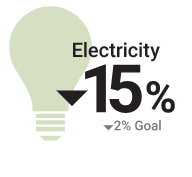Questions by Mark McDermid, Sustainability Consultant, WMEP & WBSC
Answers by Corey Meek, Corporate Responsibility Lead, Promega Corporation

Why and how did you get started on your sustainability journey?
Environmental stewardship has been part of Promega since the early days of the company. From restoring a native prairie on the Fitchburg campus to becoming the first life science company to return polystyrene foam coolers for reuse in the ’80s, Promega has valued sustainability for over 40 years. About ten years ago, increasing expectations from customers in Europe took our sustainability efforts to a new level. Some customers started requiring a report on corporate responsibility actions and performance. In response, we brought on a full-time Sustainability Coordinator to create a formal process in sustainability reporting and to grow a program. We released our first sustainability report in 2009 and joined the UN Global Compact. Our annual report shares our progress and commitments to sustainability, employees, customers, and our communities. It resonates with colleagues and customers alike and has become our “corporate brochure”, or the way we share the story of Promega.
Formalizing our program started with understanding our impacts. Once we had a baseline of our key areas of impact, we set targets for reductions and started identifying opportunities for improvement. Employees globally played a key role in this step.
The human infrastructure of formal and informal teams continues to drive improvements and increases the awareness of sustainability. Tapping into employee passions across the company and providing opportunities for individuals to get involved has also been instrumental. Sustainability updates have been incorporated in meetings like our Operations Summit, Company Town Halls, and a European Sustainability Summit to educate and involve a broad array of stakeholders on this journey.
What has gone well with your sustainability program?
Since formalizing our program, we have set and achieved three different sets of environmental goals thanks to focused action globally to reduce, reuse and recycle. Promega adopts a triple bottom line approach and recognizes our greatest business success comes from delivering value to not just the bottom line, but to customers, shareholders, employees, communities, and the planet. Our operations team deserves a lot of credit for implementing energy efficiency, water conservation, and waste minimization projects that reduce operating expenses and environmental impacts. Additionally, employee-led sustainability teams influence behavioral change and advance awareness.

In the last ten years, Promega has seen revenue and building footprint double, providing challenges for reducing impacts but also providing opportunities for infusing sustainability into how we grow. Our newest research and development facility, the Kornberg Center, is a prime example of how sustainability is a cornerstone of the design. Energy efficiency was key, so in learning from a recent building project for our German branch, the design for the US facility included a double-walled exterior for insulation, expansive windows for daylighting, natural ventilation, active slab heating and cooling, and energy recovery or enthalpy wheels. Ground source heat pumps were also included to enhance efficiencies of heating and cooling systems, as well as a 250-kw photovoltaic array help to power the facility. A rainwater collection system with 50,000 gallons of storage capacity and a green roof were integrated to further reduce impacts. These sustainability features reduce energy use in Kornberg by 65% compared to a standard facility. This is just the latest example of a sustainability-focused mindset as we design new buildings and renovate existing facilities.
What is your motivation for continuing this journey?
At Promega, we look to thrive for 100 years and beyond, and we have repeatedly found that working with the future in mind creates a better present. This long-term mindset fosters innovation and the belief that every employee makes a meaningful contribution to our work. Buildings are expected to function well over 100 years, we work locally with more than 50% of our vendors located in a 250-mile radius of the Madison campus, and profits contribute to the work of future generations. Additionally, our corporate responsibility program helps to bring people together and provides opportunities for employees to pursue their passions. The connections and relationships we make along this journey are just as meaningful and important as the destination.
Where do you see the program going for Promega Corporation?

Our program will evolve to address the urgency of issues facing our current society from climate action to pollution and freshwater. We also expect customer and regulatory requirements to continue to grow. In many markets, sustainability is a key factor in purchasing decisions and expectations have grown substantially in the last few years. Our program will evolve to address the urgency of issues facing our current society from climate action to pollution a
As businesses develop more mature sustainability programs, there are trickle-down effects on their suppliers. The Pharmaceutical Supply Chain Initiative is one example where 45 companies have aligned to promote responsible practices in their supply chains. Regulatory pressures are also likely to increase the importance of sustainability. Europe has historically led with environmental sustainability, but we are seeing growth in all regions. In Australia, all packaging waste must be recyclable, compostable, or reusable by 2025. These regulations are having a ripple effect on not just our operations in Australia, but the packaging used globally. The issues we are facing today will not be easy to overcome, but challenging times often bring out the best and remind us of the innovative capabilities we all possess.
To learn more about Promega’s sustainability visit: https://www.promega.com/corporate-responsibility-csr/planet-aware/ To learn more about WSBC visit https://www.wisconsinsustainability.com/